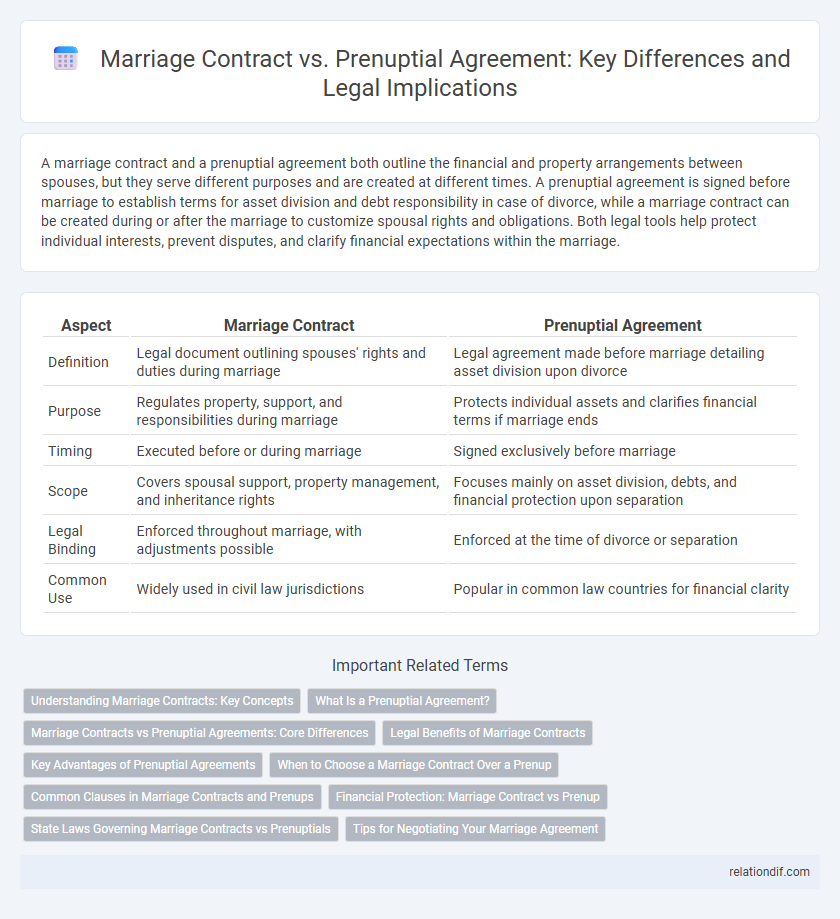A marriage contract and a prenuptial agreement both outline the financial and property arrangements between spouses, but they serve different purposes and are created at different times. A prenuptial agreement is signed before marriage to establish terms for asset division and debt responsibility in case of divorce, while a marriage contract can be created during or after the marriage to customize spousal rights and obligations. Both legal tools help protect individual interests, prevent disputes, and clarify financial expectations within the marriage.
Table of Comparison
| Aspect | Marriage Contract | Prenuptial Agreement |
|---|---|---|
| Definition | Legal document outlining spouses' rights and duties during marriage | Legal agreement made before marriage detailing asset division upon divorce |
| Purpose | Regulates property, support, and responsibilities during marriage | Protects individual assets and clarifies financial terms if marriage ends |
| Timing | Executed before or during marriage | Signed exclusively before marriage |
| Scope | Covers spousal support, property management, and inheritance rights | Focuses mainly on asset division, debts, and financial protection upon separation |
| Legal Binding | Enforced throughout marriage, with adjustments possible | Enforced at the time of divorce or separation |
| Common Use | Widely used in civil law jurisdictions | Popular in common law countries for financial clarity |
Understanding Marriage Contracts: Key Concepts
Marriage contracts legally outline the rights and obligations of spouses during marriage and in the event of separation, covering aspects such as property division, spousal support, and custody arrangements. Unlike prenuptial agreements, which are signed before marriage to protect individual assets, marriage contracts can be established both before and during marriage, often providing comprehensive terms tailored to the couple's unique circumstances. Key concepts include mutual consent, fairness, enforceability under family law, and clarity in defining financial and parental responsibilities.
What Is a Prenuptial Agreement?
A prenuptial agreement is a legal contract entered into by a couple before marriage, outlining the division of assets, debts, and financial responsibilities in case of divorce or separation. It specifically details rights and obligations related to property distribution, spousal support, and inheritance to protect individual interests. Unlike a general marriage contract, a prenuptial agreement focuses primarily on financial and legal arrangements tied to the dissolution of marriage.
Marriage Contracts vs Prenuptial Agreements: Core Differences
Marriage contracts and prenuptial agreements both outline financial and property arrangements between spouses but differ in timing and scope. Marriage contracts are established during the marriage to address ongoing rights and responsibilities, while prenuptial agreements are signed before the wedding to define asset division in case of divorce or death. Legal enforceability varies based on jurisdiction, making it essential to consult local laws when drafting either document.
Legal Benefits of Marriage Contracts
Marriage contracts provide tailored legal frameworks that protect individual assets, clarify financial responsibilities, and outline inheritance rights, offering more precise control than standard prenuptial agreements. They establish clear terms for property division, spousal support, and debt management, reducing disputes and litigation risks in divorce or separation. These contracts also enhance certainty for both parties by specifying obligations and rights aligned with their unique circumstances under family law.
Key Advantages of Prenuptial Agreements
Prenuptial agreements clearly define asset division, protect individual property, and reduce conflicts during divorce or separation, providing financial security for both parties. They also offer tailored provisions for spousal support, debt responsibilities, and estate planning, ensuring transparency and minimizing legal disputes. This proactive legal framework enhances trust and protects personal and shared interests throughout the marriage lifecycle.
When to Choose a Marriage Contract Over a Prenup
A marriage contract should be chosen over a prenuptial agreement when the couple seeks a detailed legal framework that governs not only asset division but also rights and obligations during the marriage, including spousal support, property management, and inheritance. Unlike prenups, which primarily focus on asset protection before marriage, marriage contracts can be established both before and during the marriage, offering flexibility and comprehensive regulation of the marital relationship. Opt for a marriage contract when equitable distribution and ongoing spousal responsibilities are priorities for long-term financial and legal clarity.
Common Clauses in Marriage Contracts and Prenups
Marriage contracts and prenuptial agreements often contain common clauses such as property division, spousal support, and debt responsibility, clearly outlining financial rights and obligations. Clauses addressing inheritance rights, business ownership, and dispute resolution are also frequently included to provide legal clarity and protect individual interests. These agreements help spouses define terms to avoid potential conflicts during separation or divorce.
Financial Protection: Marriage Contract vs Prenup
A marriage contract provides a comprehensive framework for financial arrangements during and after marriage, often tailored to specific legal and personal requirements, while a prenuptial agreement primarily focuses on asset protection and division in case of divorce. Marriage contracts can include provisions for spousal support, property ownership, and debt responsibility, offering ongoing financial clarity. Prenups are typically streamlined to address financial risks upfront, minimizing disputes and safeguarding individual assets.
State Laws Governing Marriage Contracts vs Prenuptials
State laws governing marriage contracts and prenuptial agreements vary significantly, influencing their enforceability, content, and requirements. Marriage contracts often encompass broader arrangements such as property rights and spousal support, while prenuptial agreements specifically focus on asset division and financial matters before marriage. Understanding the distinct statutory frameworks and judicial interpretations in your state is crucial for drafting agreements that will be upheld in court.
Tips for Negotiating Your Marriage Agreement
Negotiating your marriage contract or prenuptial agreement requires clear communication and honesty about financial expectations and asset division. Prioritize discussing key topics such as property rights, spousal support, and debt responsibility to ensure mutual understanding and protection. Seek professional legal advice to tailor the agreement to your unique needs and comply with jurisdictional laws.
marriage contract vs prenuptial agreement Infographic

 relationdif.com
relationdif.com